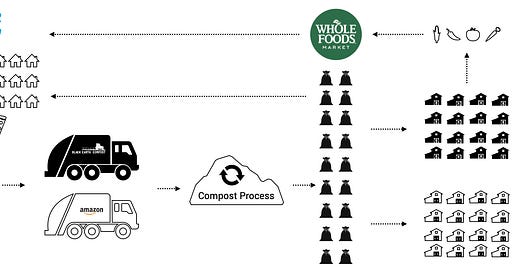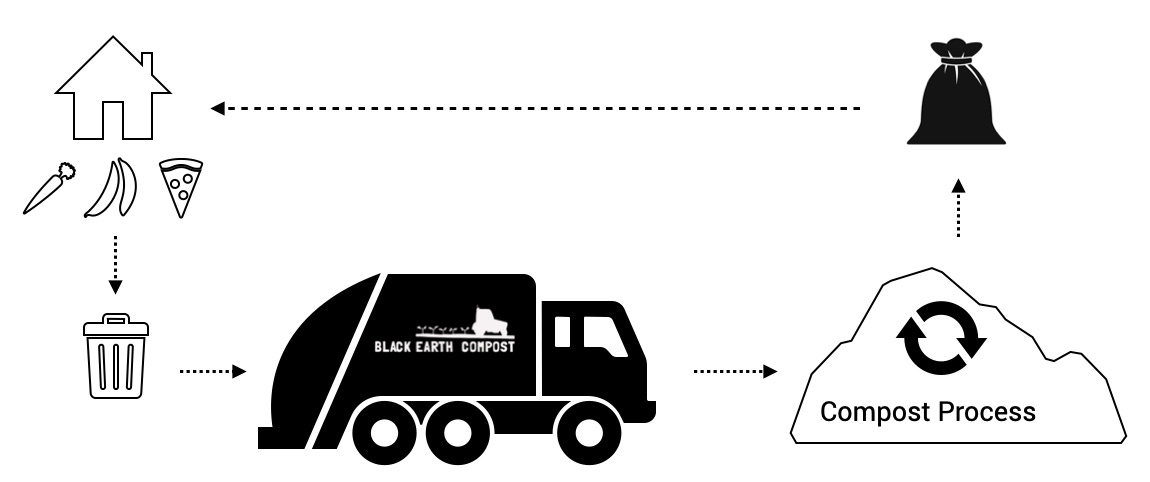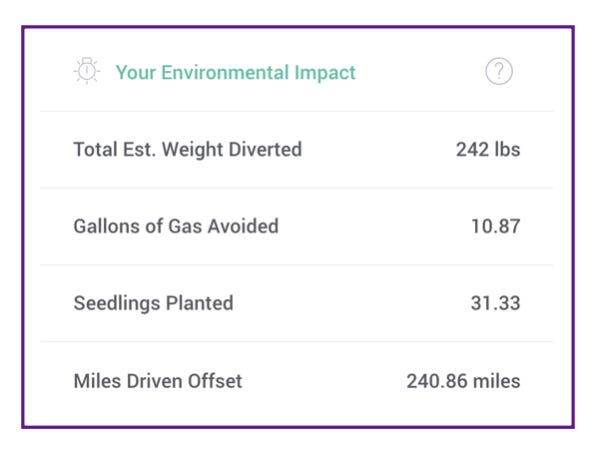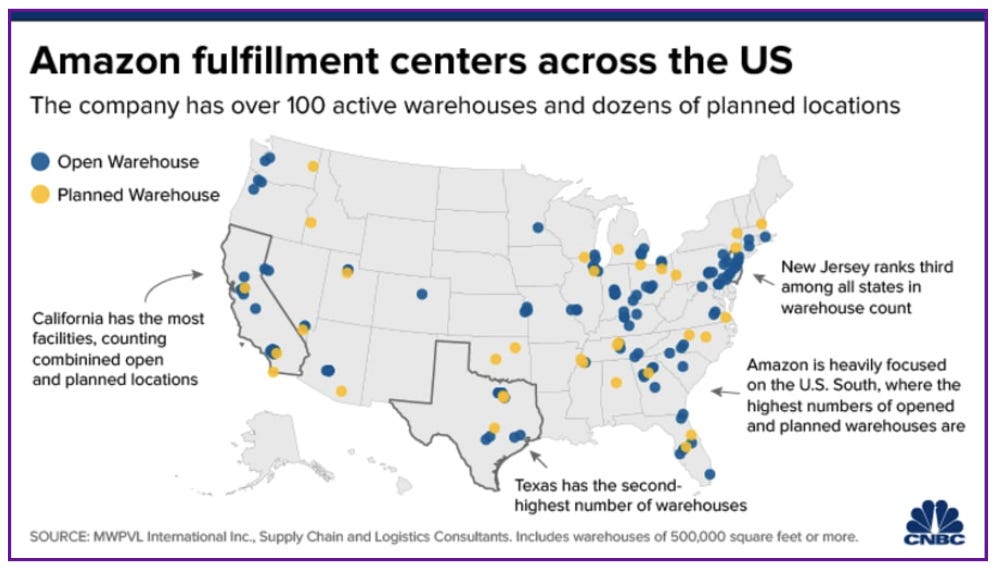SaaS Pricing is hard. PricingSaaS is your cheat code.
Monitor competitors, track real-time benchmarks, discover new strategies, and more.
While we like to think humans will naturally do the right thing, a lot of the time, it takes an extra push to change behavior.
For example, after years of Amazon employees demanding action on climate change, September 2019 marked a breaking point for CEO Jeff Bezos.
The day before 1,749 Amazon employees were scheduled to join the Global Climate Walkout, Bezos committed to meeting the goals of the Paris climate agreement 10 years ahead of schedule and to be carbon neutral by 2040.
Proving it wasn’t just lip service, this past February, Bezos doubled down with a $10B donation towards the Bezos Earth Fund. Upon making the donation, he said:
Climate change is the biggest threat to our planet. I want to work alongside others both to amplify known ways and to explore new ways of fighting the devastating impact of climate change on this planet we all share.
It may be a fever dream, but I believe there is a known way to actively fight climate change that Bezos and Amazon are uniquely qualified to bring to the masses. If successful, they would not only further their environmental mission but transform consumer behavior in the process. The idea is Prime Composting.
This idea rests on 3 arguments:
Composting can be a great business
Composting would further lock-in Amazon’s position in the battle for the home
Amazon already has key pieces in place to tackle composting at scale
We’ll unpack each of these in short order, but first, what is composting, and why aren’t more people doing it?
The Roadblocks to Composting
Composting literally turns trash into treasure.
Put simply, when you add organic waste to the right mix of soil, water, and oxygen, it decomposes naturally and produces a rich fertilizer that benefits the environment.
This has two key implications:
By keeping organic waste out of landfills, composting reduces greenhouse gasses and cuts down on air and water pollution.
The resulting byproduct, aptly called compost, has the power to restore soil and fuel a sustainable food system, reducing the need for synthetic fertilizers that harm the environment.
Sounds great, right?
So, why isn’t everybody doing it…
First, not everyone knows about it. Before being gifted a subscription, I was loosely aware of the benefits of composting, but not enough to pursue it on my own. I imagine beyond my level of ignorance, a lot of the population doesn’t even know composting exists.
Even if you do know about it, there are hurdles to actively participating.
The first is availability. The compost industry is split between public (municipal) and private. While some regions have better coverage than others, neither option has consistent representation nationally.
Lastly, composting can be expensive. A private compost subscription is not cheap for consumers, and creating a composting facility requires high upfront costs for business owners. This creates a stalemate, as both sides have a barrier to entry.
Lastly, if you don’t mind getting your hands dirty, you can compost on your own, but doing so requires dedicated space, know-how, and investment in time and resources.
Up until this point, the most compelling argument to incentivize widespread composting has been government subsidies. This is great in theory, but given the disconnect between federal and state governments, execution would take forever.
That's where Amazon comes in.
Amazon is available everywhere, has plenty of capital for upfront investments, and also has a subscription program that could subsidize the costs of composting for consumers.
Now, why would Amazon do this?
Beyond the alignment with the Bezos’ Climate Pledge, there’s another really good reason - composting can be a great business.
The Business of Composting
When my wife and I moved into our house in the suburbs last November, our brother and sister-in-law gifted us a composting subscription.
As somebody who works with subscription companies for a living, I was immediately intrigued. Composting, I found, is not charity. In fact, it's an awesome subscription business.
Here’s how it works…
My wife and I pay $200 per year for our composting service through a local company called Black Earth Compost.
Every Wednesday, Black Earth picks up our bin, and in the Spring we’re rewarded with a bag of compost. The compost can be used to start a garden, fertilize plants, or dress your lawn.
Here’s a simple visual breaking down the cycle:
The reward is bigger than the bag of compost though. Black Earth also tracks our environmental impact, estimating the effect of our efforts.
And there’s more…
One of the first things you realize when you start composting is how much of your trash is compostable. Since starting, we’ve rarely exceeded one bag of trash a week - the vast majority of our waste is either recyclable or compostable.
This leads to a Marie Kondo-esque satisfaction of everything in its right place. This feeling is powerful. When we travel to places where we can't compost, something feels off. Last month, I felt a wave of guilt throwing a banana peel in the trash 😅
This feeling, at its core, is why composting is such a strong subscription business. It’s habit-forming. In software, we’d call this a sticky product. Once a household starts composting, they’re unlikely to stop.
Beyond having a sticky product paid in regular installments, what else makes composting such a great business model?
First, collection occurs on a regular cadence.
Every Tuesday night, we get an email reminding us to put our bin out. Most brands would kill for a natural weekly touchpoint to check-in with customers. If they wanted to, Black Earth could use the email to check if we need more composting bags to line our bins. They don’t currently do this, but imagine the cross-promotion opportunities for Amazon?
This brings us to the next reason: regular add-on revenue. Black Earth sells bins, bags, and gardening supplies. While we haven’t bought gardening supplies yet, we plan to eventually - and we’ve already re-ordered bags for $30, a solid 15% of the baseline subscription cost. Needless to say, Amazon could boost that add-on revenue considerably - looking at books alone there are 1,000+ titles that come up under the keyword “composting” on Amazon.com.
The other thing about composting is that it has built-in virality. I was shocked to learn my town only has 120 residents using Black Earth Compost because I see so many bins lining the sidewalk in our neighborhood. While difficult to prove, my hypothesis is that the more people participate in a given neighborhood, the more likely neighbors are to follow suit.
Along with natural virality, Black Earth has an amazing referral program. Subscribers can earn free composting by referring new members, with escalating incentives for more referrals (e.g., if you refer a school or business you can get free composting service for a year).
So this is all great, but where does Amazon fit in?
The Case for Prime Composting
First and foremost, Amazon is the current leader in the battle for the home, and composting would add an entirely new axis that fits seamlessly into their home lynchpin: Alexa. In his 2017 article Alexa: Amazon’s Operating System, Ben Thompson wrote:
Amazon doesn’t need to make a dime on Alexa, at least not directly: the vast majority of purchases are initiated at home; today that may mean creating a shopping list, but in the future it will mean ordering things for delivery, and for Prime customers the future is already here. Alexa just makes it that much easier, furthering Amazon’s goal of being the logistics provider — and tax collector — for basically everyone and everything.
It’s not hard to imagine a weekly Alexa reminder to put your compost bin out the night before pick-up. New practitioners could even ask Alexa for clarification on which items are compostable.
Further, with companies like Winnow already deploying similar technology, I could see Amazon developing a compost bin that scans the food you’re disposing of, adds the items to your grocery list, and automates the delivery of those items through Prime Now for easy re-stocking.
Beyond developing the kitchen of the future, Amazon has the biggest subscription product in the world, Amazon Prime. They have a history of adding new services and value to the Prime bundle and could offer composting services for an incremental fee that would likely end up far cheaper than a local provider.
While demand for compost in some places is high, in other areas, adoption would require incentives. Amazon is better equipped than any company in the world to offer such incentives. Whether it’s discounts on Prime subscriptions, discounts to products on Amazon’s website, or discounts to Whole Foods, they have more levers to pull than anyone.
Amazon’s marketplace experience also means local providers don’t need to suffer. If building a national compost infrastructure was easy, it would already exist. To start, Amazon can open up its marketplace to local compost companies, letting them tap into the Prime subscriber-base to fuel growth. In the meantime, Amazon can identify regions of opportunity and begin building out their own composting infrastructure.
Amazon can leverage its ever-growing logistics business to coordinate this effort. Their logistics experience will allow them to identify where they have the most opportunity, and which sites make the most sense given Prime subscriber density and fulfillment center locations.
Okay, so say Amazon ramps up Prime Composting, and millions of people start doing it. All of a sudden, we have an abundance of compost product. What do we do with it?
To start, Amazon could offer the same voucher program as Black Earth. While this would make sense for subscribers with a garden or a yard, many Prime subscribers live in the city and don’t have a personal need for compost. For these folks, Amazon could offer vouchers for Amazon or Whole Foods instead.
But, you may ask, won’t that result in even more excess product?
Yes, indeed it will.
Luckily, Amazon happens to own a grocery chain with a network of thousands of organic farms that could likely absorb a good deal of this product. Surplus compost could be funneled back into the Whole Foods grower network, allowing farmers to improve their soil and thus, improve the Whole Foods product.
Beyond their own farmer network, Amazon could become a critical supplier to farmers nationally, and donate excess compost to revitalize land that would otherwise go to ruin. Here’s how the updated cycle might look:
We’ve made it this far, and haven’t even touched on one of the biggest benefits of all: Optics.
How GOOD would this look for Amazon!?
Donations are one thing, but productizing a way to fight climate change would take their commitment to another level.
Most industries revolt when a massive company tries to solve their challenge at scale, but I truly believe that even fiercely independent compost advocates would have a hard time fighting this. It would put the cause into hypergrowth.
Teach a Man to Fish
While $10B will inevitably help fight climate change, changing long-term human behavior would have an even greater impact, and sometimes, all it takes is a small carrot to motivate action.
To quote Berkshire Hathaway Vice Chairman Charlie Munger:
I think I’ve been in the top 5% of my age cohort all my life in understanding the power of incentives, and all my life I’ve underestimated it.
With over 150 million members, Amazon has the subscriber-base to drive serious change and the ability to incentivize action.
They also have the subscription model and the grocery business to reap many of the rewards, plus it would further embed them in the home.
Lastly, Amazon has the logistics and marketplace experience to support local compost companies and farmers alike.
It’s a win-win-win-win and aligns with an initiative that their CEO has publically called the biggest threat to our planet.
So, Mr. Bezos, how do you feel about composting? 🤷🏼♂️
Enjoying Good Better Best?
If you enjoyed this post, I’d love it if you hit the “like” button, that way I’ll know which posts are resonating the most!
If you have thoughts or feedback, I’d love to hear from you! You can find me on Twitter here.







